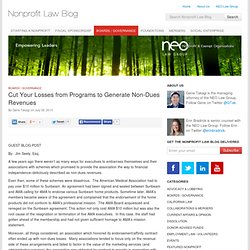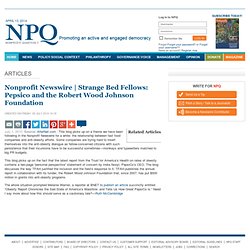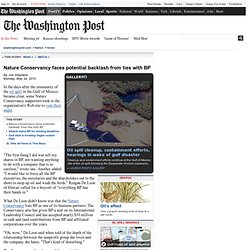

Nonprofit Advocate Carves Out a For-Profit Niche. Cut Your Losses from Programs to Generate Non-Dues ... By: Jim Seely, Esq.

A few years ago there weren’t as many ways for executives to embarrass themselves and their associations with schemes which promised to provide the association the way to financial independence–deliciously described as non-dues revenues. Even then, some of these schemes were disastrous. The American Medical Association had to pay over $10 million to Sunbeam. An agreement had been signed and sealed between Sunbeam and AMA calling for AMA to endorse various Sunbeam home products. Sometime later, AMA's members became aware of the agreement and complained that the endorsement of the home products did not conform to AMA’s professional mission. Moreover, all things considered, an association which honored its endorsement/affinity contract often ended up with non-dues losses. In addition, there is the cost of lost opportunity to be considered.
Many, perhaps most, executives have been burned or scalded by one or more of these non-dues programs. Social Innovation Conversations. Churches, Nonprofits Fight for Survival Amid Spill. Strange Bed Fellows: Pepsico and the Robert Wood Johnson Foundation. Related Articles July 1, 2010; Source: AlterNet.com | This blog picks up on a theme we have been following in the Nonprofit Newswire for a while: the relationship between fast food companies and anti-obesity efforts.

Some companies are trying hard to insert themselves into the anti-obesity dialogue as fellow-concerned citizens with such persistence that their incursions have to be successful sometimes—monkeys and typewriters matched to big PR budgets. This blog picks up on the fact that the latest report from the Trust for America’s Health on rates of obesity contains a two-page “personal perspective” statement of concern by Indra Nooyi, PepsiCo’s CEO. The blog discusses the way TFAH justified the inclusion and the field’s response to it. TFAH publishes the annual report in collaboration with its funder, the Robert Wood Johnson Foundation that, since 2007, has put $500 million in grants into anti-obesity programs. "Nature Conservancy faces potential backlash from ties with BP: Environmental nonprofits face potential backlash as supporters learn of ties to BP" By Joe Stephens.
In the days after the immensity of the oil spill in the Gulf of Mexico became clear, some Nature Conservancy supporters took to the organization's Web site to vent their anger.

"The first thing I did was sell my shares in BP, not wanting anything to do with a company that is so careless," wrote one. Another added: "I would like to force all the BP executives, the secretaries and the shareholders out to the shore to mop up oil and wash the birds. " Reagan De Leon of Hawaii called for a boycott of "everything BP has their hands in. " What De Leon didn't know was that the Nature Conservancy lists BP as one of its business partners. The Conservancy also has given BP a seat on its International Leadership Council and has accepted nearly $10 million in cash and land contributions from BP and affiliated corporations over the years.
"Oh, wow," De Leon said when told of the depth of the relationship between the nonprofit group she loves and the company she hates. Corporate Giving When Corporations Aren’t There. May 10, 2010; Worcester Business Journal | There has been a lot of talk about corporations maintaining their charitable giving despite the recession. Some of that seems to be hype, some of it in-kind contributions and volunteer time as substitutions for money. Nonetheless, corporate giving is typically concentrated on cities with headquarters and major facilities. Small cities without a lot of corporate executive presence are generally out of the running, regardless of the reports of corporations’ “giving back” to their communities.
Places where corporations are leaving due to shutdowns or mergers experience sharp reductions in corporate giving. It’s not just the corporate grantmaking that makes the difference, it is the presence of corporate workforces available for United Way payroll deduction charitable campaigns.